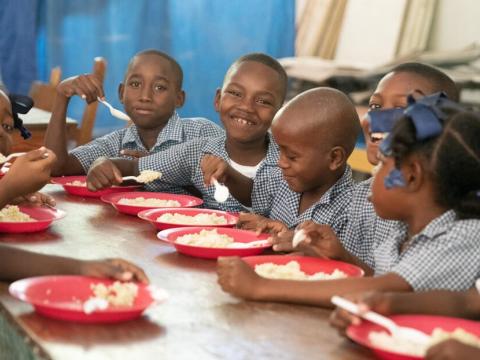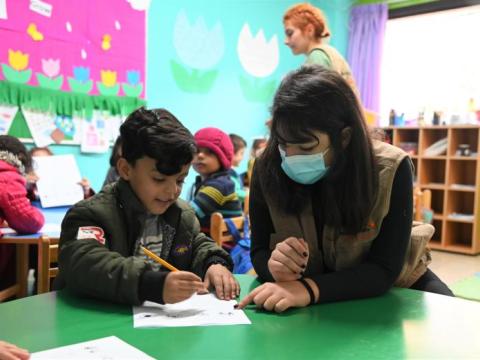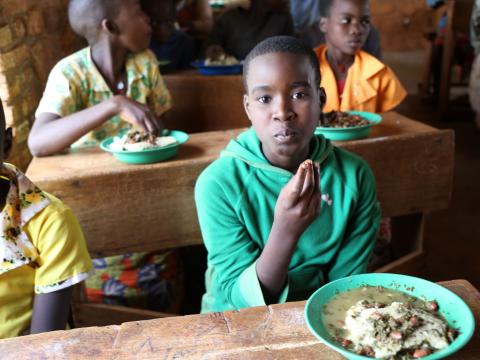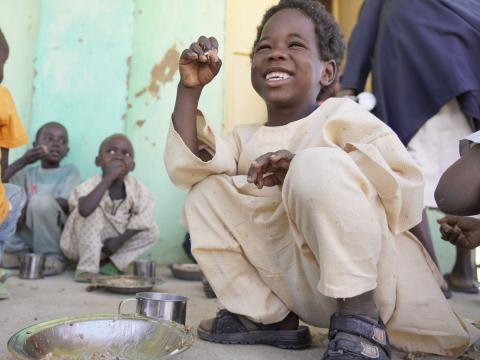
School meals are life-changing, but not as easy as ABC
Encouraged by WFP's State of School Feeding Worldwide 2022 report,
Charlotte Masiello-Riome cautions against the world giving itself a passing grade.
Join the School Meals Global Summit 18-19 October 2023
I will never forget 2001. It was the year I first met George McGovern, the United States Ambassador to the United Nations Food Agencies, in Rome. He had just returned from an intense trip evaluating innovative school meal programmes in countries including Bolivia and Bangladesh. McGovern was the United Nations' first Global Ambassador on Hunger.
As a young woman starting her career in the UN system, I considered the Ambassador a 'rock star'. McGovern worked tirelessly with the World Food Programme (WFP) to help design and implement, and to advocate for funding for school feeding programmes in countries where children were most vulnerable to malnutrition and hunger. For many years, McGovern and his staff acted as my mentors. They guided me through the procedures, challenges and advantages of addressing global hunger and promoting education through the establishment of school meals programmes.
That time in my life left me with a profound belief in school meals as a ‘safety net’ protecting children from economic and societal shocks.

Recently, the World Food Programme released its latest flagship report State of School Feeding Worldwide 2022, providing an overview of the state of school feeding programmes worldwide, and it's inspiring to read. Nearly 420 million children across the globe receive school meals – that's 30 million more than in 2020.
This translates into the number of children served by school meal programmes in 2022 having surpassed pre-pandemic levels, and the potential damage caused by school closures is under repair. Furthermore, this recovery has received more than 90% of its funding from domestic sources, and almost all countries have formally adopted national policies to help ensure that these commitments continue.
We all know how difficult it is for children to concentrate in class and engage in learning when they are hungry. By providing meals at school, World Vision is helping to ensure that children are well-fed and ready to learn. Last year, together with WFP, we supported more than 14.3 million people – 60% of whom were children – with food assistance as well as cash and vouchers in 28 countries. In many countries where we work, a child's school meal may be their only meal for the day.
However, school meals offer more benefits than meets the eye. At World Vision, we have been partnering with the World Food Programme for more than 30 years. We are continuing to see the positive impacts of school feeding every day.
In 2022, World Vision Sudan and WFP implemented a school feeding programme, Food for Education, providing daily hot meals and dry take-home rations to girls and boys in 266 schools in East and South Darfur. Reaching over 140,000 girls and boys in East and South Darfur, the food for education programme has contributed to reduced school drop-out rates giving more children an opportunity to learn; improved nutrition; improved school performance; addressing the immediate food gaps in homes; and a community's wellbeing.
Our school feeding programme in the Central African Republic provides a healthy, nutritious meal to 65,000 students and keeps them in the classroom, reducing the risk of child labour. In 2021, there was a strategic shift from emergency school meal programmes towards more systems-strengthening approaches to support the government's national education and economic development priorities. This has meant pivoting to a home-grown school meals approach for school meals.

The WFP State of School Feeding 2022 report shows that school meal programmes have created approximately 4 million direct jobs in 85 countries, which equates to 1,377 jobs for every 100,000 children fed. Most of these jobs are related to the preparation of food, benefitting local cooks and small catering companies, most of them led by women. As implementers for the McGovern-Dole International Food for Education and Child Nutrition Project Educating Children Together in Minheune, Mozambique, school administrators have seen an 85% increase in school attendance due to school meals. Furthermore, the programme has benefited the community by providing catering employment and after-school job opportunities.
This year, World Vision is adding additional programming, including an early grade literacy programme called Unlock Literacy that entails teacher training in early grade literacy; community participation, such as training sessions for parents in supporting literacy; and reading camps in which literacy volunteers in the community meet with children weekly outside of school to motivate children to read.
It is important to note that our school meals work has also shown immense benefits as regards gender equality. By providing girls with access to education and nutritious meals, school meal programs can help empower girls to become agents of change in their communities. Educated girls are more likely to earn higher wages, marry later, and have fewer children. My colleague, Daniel Wanganga, (himself a School Meals Programme beneficiary growing up in Kenya) recently shared with me an old African Proverb: 'If you educate a man, you educate an individual, but if you educate a woman, you educate a family.'

Although these findings inspire me, I am fully aware discrepancies continue. In 2022, in rich countries, 60% of schoolchildren received school meals, compared to low-income countries, which reported only 18%. This is 4% lower than pre-pandemic levels, with Africa experiencing the most significant declines. The report also discovered that some low-income countries have been unable to rebuild their national programs and require additional assistance. Less than 10% of schoolchildren in eight African countries receive a free or subsidised school meal.
George McGovern's legacy as an advocate for school meals is anchored in his unshakeable dedication to fighting poverty and malnutrition and his belief that access to nutritious food is a fundamental human right and an essential element of world peace and stability. As its largest implementation partner, World Vision continues working with WFP and other partners to ensure school meals reach the most vulnerable children.
Yet, with the cooperation and technical assistance of UN agencies and partners from civil society, it is national governments who must lead the way in incorporating school meal programmes into national development plans and budgets. National governments too have a major role in creating suitable environments to institute and develop such programmes to ensure every child has access to nutritious meals.
Despite a lot of excellent progress when it comes to feeding hungry school children our grades are climbing, but we all still have much more to do together before we can graduate.
Charlotte Masiello-Riome is Senior Communications and External Engagement Advisor for World Vision International. She represents the organisation on the School Meals Coalition, an initiative of governments and a wide range of partners to drive actions that can urgently re-establish, improve and scale up food and education systems, support pandemic recovery and drive steps to achieve the Sustainable Development Goals (SDGs). Learn more on how to get involved and take action.



